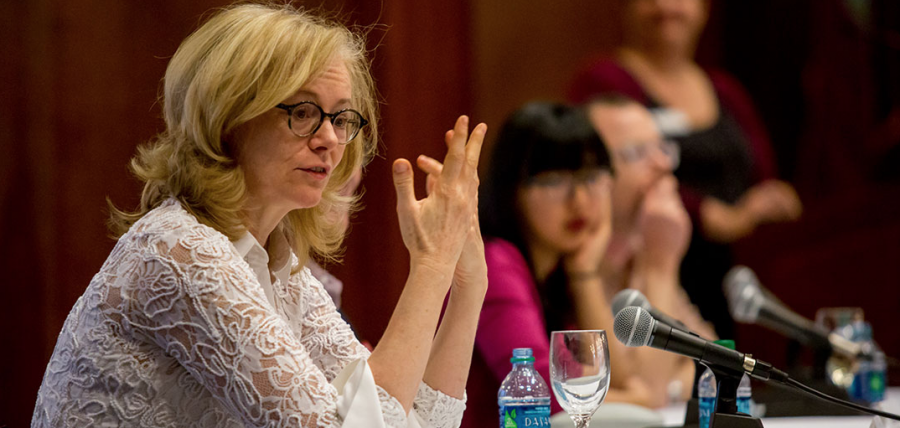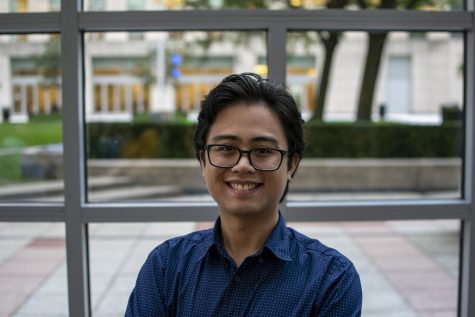Retention Task Force Tackles Recurring Issues
Mary Bly is one advisor working with President Joseph M. McShane on the task force. (COURTESY OF FORDHAM NEWS AND MEDIA RELATIONS)
November 14, 2018
“A student came in … and she was troubled,” Interim Dean of Fordham College at Lincoln Center (FCLC) Frederick Wertz said. “She was crying, she was in tears … there are some students who are really lost, who are not as courageous. There’s discomfort [at Fordham]. That’s our challenge.”
On Oct. 18, the Arts and Sciences Council met to speak on various issues facing Fordham University. The council, which is responsible for generating academic recommendations for the whole of the university, raised concerns regarding the retention rates among undergraduate freshmen. Although exact numbers haven’t been given, the estimate is that Fordham’s most recent freshman retention rate is around 82 to 84 percent, according to statements made by Wertz and Assistant Dean for Freshmen and Director of Academic Advising at FCLC Joseph Desciak.
In April 2017, University President Rev. Joseph M. McShane, S.J., formed the Task Force on Undergraduate Retention. Included in the task force were members of the Office of Enrollment Services, various academic departments and faculty at FCLC, Fordham College at Rose Hill (FCRH) and the Gabelli School of Business. Among the pointmen of the task force is Wertz, who has taken charge of outreach to students on campus. “It’s not like we’re bad or anything like that. But, with the Jesuit mission, we want to retain 100 percent,” he stated. Wertz’s dissatisfaction with the numbers has led him and others to seek solutions to this issue.
Peter Feigenbaum, director at the Office of Institutional Research at Fordham, explained the numbers further. “Our retention rates at Fordham are much higher than most,” he said. Total undergraduate retention hovers around 91 percent for four-year students. The numbers, however, can seem deceptively high. Freshmen and sophomores have retention rates that fall below expectations, while retention among juniors and seniors was much higher. “There are close to 2000 students, let’s say. Roughly 9 percent of that is a fairly high number of students. That’s a concern for the university,” Feigenbaum stated.
Wertz explained that there is a new piece of software that the faculty are testing to better gauge student engagement: Student Success Collaborative (SSC) Campus. “It will enable advisers to identify students that are at risk,” he said. The new software allows for better communication between advisors and the deans, improves tracking student engagement vis a vis how often they go to advising sessions and assesses how at-risk a student is of possibly dropping out or transferring. SSC Campus is currently in its trial stages, and the faculty hope to expand its use to a wider scale beginning next fall, so that all academic advisers can begin to use the software.
“The most important thing we’re look at is the campus culture and how students are engaged,” Wertz said. “If they stay as freshmen and are engaged as sophomores, then we’ll keep them [at Fordham].” Wertz explained that there were a number of programs, primarily targeted at freshmen, that aimed to increase engagement with students. He said that they themed it as the “Year of Magic.” These included assigning the book, “The Magicians” by Lev Grossman, to all incoming freshmen, and having events like bringing in Adeola Role, a theatre instructor at FCLC, to talk about her job as an understudy in the “Harry Potter and the Cursed Child” musical. Other events included trips to the New York Historical Society and watching shows that feature David Copperfield. Wertz explained that these programs were all about giving freshmen some common ground, which would make it easier for them to feel at home.
The task force is currently in the midst of preparing a report that will better break down the numbers behind last years’ retention rates. The report will be available in a few weeks to members of the task force, and a public version will be released some time after that. The numbers are being divided by various demographic lines including gender, race, religion, housing status, whether they are the recipient of a scholarship and other factors. Feigenbaum explained: “The literature indicates that these are important features. I’m looking at eight years worth of cohorts. This will give us some insight into why students leave and when they choose to do so.”
“I think the more value there is in a Fordham education, the more people are willing to make the financial sacrifice,” Wertz said.
The concerns raised, which seem to be similar on both campuses, revolve primarily around a feeling of disconnect that permeates the collective student body.
Shane Ceniza is a sophomore at Lehman College, the Bronx campus of Hunter College under the City University of New York. Ceniza is a transfer student from FCRH, having left after his freshman year. “I went to Fordham on a scholarship,” he said. “But by the end of freshman year, I could not keep my GPA and had to leave.”
A commuter student since attending high school, Ceniza spoke about how he did not feel like he belonged at Fordham, that there was an inherent disconnect between the commuters and residents on campus. “I feel like I went to Fordham and then I went home and there was nothing I could do. I didn’t feel at home. I didn’t feel like I could focus. I didn’t feel right.”
“I just feel like the academics at Lehman are the same if not better,” said Ceniza. “The value is much better than at a private school.”
Mary Bly, associate dean of strategy initiatives, said that her position was created in order to specifically deal with issues surrounding undergraduate retention. “I was in a focus group with Fr. McShane last year,” she said. “[The students there] all talked about how they didn’t fit in and [felt lonely].” Bly continued, “For freshmen, it’s very difficult particularly because half the people are commuting. It’s also hard to get in different groups. How do you meet people outside orientation? Each of the freshmen events are designed to draw in different groups.”
Bly is optimistic about the effectiveness of the new freshman programs. “I think we’re going to do significantly better in terms of retention than last year,” she said. She mentioned that many new retention cases are being solved through more interpersonal means, including advisers getting to know their students better by sitting down with them or going to get coffee with them. “We’re trying to employ that [sort of] one-on-one,” she said. ”We’re giving every core adviser money every semester to take their students for a milkshake or something, just as a way to make this thing more personal.
“The world is a much darker place than when I went to college,” Bly said on trying to explain why she feels that students these days are more “fragile.” “I’m seeing a lot of anxiety in all these students, tied to various different things [but] I think it’s loneliness. Loneliness is a systemic problem.
“One of the things I keep hearing over and over again is that [students’] friends are having such a great time,” she said. “When I inquire, it’s always all the pictures on Instagram that make it look like everyone’s partying at home, and then here at Fordham, you have your midterms. You feel the anxiety. The pictures on Instagram are not reality. Those people are sweating their midterms, too, but it doesn’t feel that way.”
Bly also felt that financial aid was a critical factor in why students might choose to leave, but noted that the university has a tough time getting everything they need. “I can see how [Development and University Relations] is just desperately asking people for scholarships and getting money and trying their best … it’s a very difficult environment.”
I think we’re doing the right thing,” Bly said. “I wish we could do even more.”












nabiha chowdhury • Feb 19, 2021 at 12:02 pm
Doing the right thing is not a solution, You must do the right thing More so that Transfer and Commuting students don’t feel like an add on.
For a Top tier University with 58K in Tuition, that excuse is not credible and should not even be given, lets get to the real work Rams, be inclusive, be proactive, be concerned and ACT to make that difference.